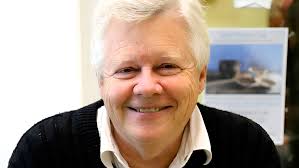 I don’t know Lenox Napier in person. A shame, as I think we are kindred spirits. I only “know” him through his prolific output and from reading about his history, which is fascinating as well as controversial. More of that later.
I don’t know Lenox Napier in person. A shame, as I think we are kindred spirits. I only “know” him through his prolific output and from reading about his history, which is fascinating as well as controversial. More of that later.
We communicate frequently online. I react positively to his musings, and he seems to like what I write.
We really must meet up before we’re dead or too senile.
So …..
Trouble is, Mojácar (Almería), where Lenox lives, is a good five hours by road from my home in Ronda (Málaga).
I spent a very enjoyable two weeks in Mojácar when my kids were 5 and 2 years old (they are now 41 and 38!). However, from what Lenox writes, the place has “gone to the dogs”!
English friends of ours, property speculators, are cutting ties with the Serrania de Ronda, where they have bought, done up and sold a number of houses, and will be living from now on in Cabrera near Mojácar.
 So, now we have two reasons to go. To meet Lenox, and to visit A and T.
So, now we have two reasons to go. To meet Lenox, and to visit A and T.
No, three reasons. My second and current wife, Rita, has never been there.
Let’s see what happens in 2025 …..
***
Back to Lenox Napier, here’s a précis in English of an article about him which appeared in Spanish in La Voz de Almeria earlier this year (2024).
11 May, 2024
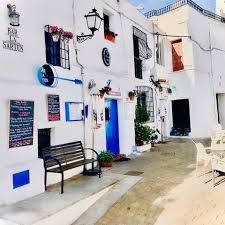 Lenox Napier is an affable Englishman, a mojaquero since 1967. He was born and raised as an only child to wealthy bohemians in the county of Norfolk in eastern England. Lenox's parents were the first foreigners to open a bar in Mojácar.
Lenox Napier is an affable Englishman, a mojaquero since 1967. He was born and raised as an only child to wealthy bohemians in the county of Norfolk in eastern England. Lenox's parents were the first foreigners to open a bar in Mojácar.
The bar is still there in the church square; it is called La Sartén.
Lenox Napier has dedicated his life to communicating with people, to his family, and to his horses.
"My parents liked to drink, which didn't fit well with sober Englishmen. We used to visit Spain and the south of France yet finally they decided to settle in Almeria," says Lenox.
Lenox speaks, in Spanish, with admirable honesty, a slow voice and a strong British accent. He says that his character as a foreigner in Spain has allowed him to be peculiar. “Nowadays I feel quite out of place in England,” he admits.
When Lenox arrived in Almeria, it was the era of the “spaghetti western”. It was also a refuge for artists and a favourite spot for Hollywood stars. The tourist boom was yet to come.
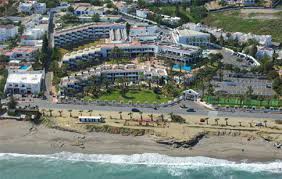 "The mayor was a great man, he promoted Mojácar and managed to bring the Parador to the town," says Lenox.
"The mayor was a great man, he promoted Mojácar and managed to bring the Parador to the town," says Lenox.
The story goes that the mayor, Jacinto Alarcón, went to Madrid and sat in front of the door of the office of the Minister of Information and Tourism, Manuel Fraga, and did not move until the chief of staff confirmed the construction of the Parador in Mojácar.
"It was said that the eldest son inherited the house in the village and the youngest a piece of land on the beach, no one wanted to live near the sea. The mayor gave land to people to build and live in," Lenox recalls.
Mojácar was on the verge of disappearing as a town in the last third of the 20th century due to depopulation, emigration and lack of economic activity.
It was a coastal town with no fishing industry, they only had subsistence farms (huertas de subsistencia).
Lenox, who was a teenager at the time, having just come to Spain from an English boys' boarding school with more than 700 boys, attended a school in Sevilla where he was regarded by his fellow pupils as an exotic specimen.
A year later he left school and went travelling with the money he had inherited. He discovered the United States, Mexico and France until he returned to Almeria and founded the newspaper The Entertainer.
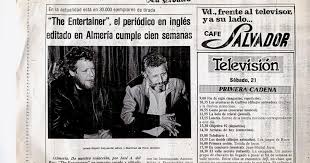 He had never had contact with the world of business or journalism before, but he was passionate about literature.
He had never had contact with the world of business or journalism before, but he was passionate about literature.
"The Entertainer was a free newspaper that ran from 1985 to 2000. It went out three times a week in Marbella, Altea and Mojácar. We printed 40,000 copies on the press of La Voz de Almería and from there it was distributed to more than 1,400 different collection points," he says.
“It was one of the first English-language newspapers in Almeria, it lived off advertising and had no institutional support,” says Lenox somewhat miffed.
In the end, he sold the paper in a deal from which he emerged somewhat burned. "I've always liked writing, but not the business. Although I don't really care, I've made it this far safe and sound" and lets out a laugh.
Lenox also wrote for the publication El Indálico and worked at Cope Mojácar. “Good years, good memories.”
Lenox is a traditional and idealistic man, defender of Almeria and connoisseur of its history, gastronomy and culture.
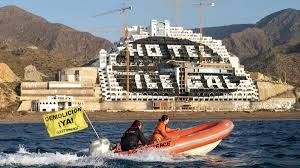 He is still indignant when he remembers the illegal houses that were built during the real estate boom of 2008 or the ugliness of the illegal hotel in Algarrobico.
He is still indignant when he remembers the illegal houses that were built during the real estate boom of 2008 or the ugliness of the illegal hotel in Algarrobico.
Lenox gave voice to this cause because many foreigners bought properties that did not even have a deed and, he considers that this greatly damaged the image of the province.
Today, retired to his house in Mojácar, under a roof of reeds and wooden beams that support the whitewashed walls, he remembers his time in the area.
How the Press changed after the coming of the internet.
 Every week he writes a blog called Business Over Tapas and to date there have been more than 500 posts. Subscribers receive the weekly in their email although it can also be read on the Facebook page of the same name.
Every week he writes a blog called Business Over Tapas and to date there have been more than 500 posts. Subscribers receive the weekly in their email although it can also be read on the Facebook page of the same name.
"I don't make money, I gain notoriety and we authors like this a lot," he says with a laugh.
The news-reporting is very thorough, politically left-leaning, but free enough to give Pedro Sánchez's government a ticking-off when required.
"When you're old you either die bored or you do things. I never liked television; I find it very passive. But I have always liked to write and to read because with a book you can travel", wise words from this most Almerian of foreigners in Mojácar
Controversy
Lenox Napier has had the odd bit of bother over his nearly six decades living in Mojácar.
Possibly the worst was when he was accused, tried and found guilty of defaming Michel and Steven Euseden, back in 2014.
 However, all was not as it seemed. The circumstances surrounding the Euesdens’ acquisition of The Entertainer (later re-named the Euro Weekly News) were highly suspicious. In the view of one commentator at the time, the Euesdens stole The Entertainer.
However, all was not as it seemed. The circumstances surrounding the Euesdens’ acquisition of The Entertainer (later re-named the Euro Weekly News) were highly suspicious. In the view of one commentator at the time, the Euesdens stole The Entertainer.
There is no question that Lenox Napier’s published attacks on the Euesdens were over the top but with just cause and legally sufficient reason.
The paltry sum awarded by the court is merely a token acknowledgement that the Euesdens were defamed.
Read the full story here:
Lenox Napier found guilty of defaming the Euesdens - Olive Press News Spain
More Controversy
ANIMAL RIGHTS FOCUS: A positive view of bullfighting in Spain
Those who have their ideas made up about ‘animal cruelty’ or ‘Spanish stone-age traditions’ aren’t going to be swayed by me talking loftily about ‘art’, ‘culture’ or that fruity word ‘catharsis’.
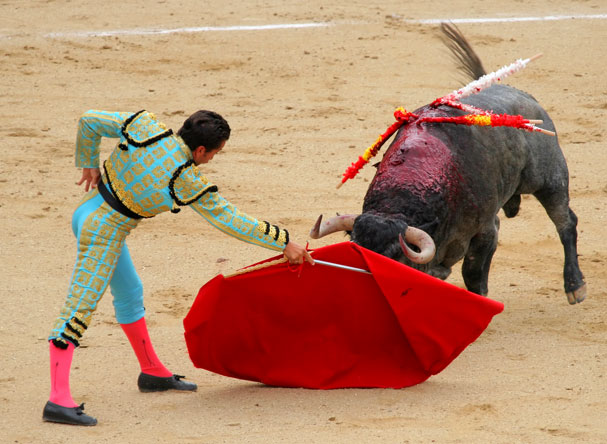 Many British residents in Spain have been ‘got at’ by their white-bread diet of satellite television and entertainers of the standard of Ricky Gervais, who makes his name by publicly playing with puppies and repeatedly announcing that anyone who doesn’t follow his wholesome lead is an utter shit.
Many British residents in Spain have been ‘got at’ by their white-bread diet of satellite television and entertainers of the standard of Ricky Gervais, who makes his name by publicly playing with puppies and repeatedly announcing that anyone who doesn’t follow his wholesome lead is an utter shit.
Read the full article here:
ANIMAL RIGHTS FOCUS: A positive view of bullfighting in Spain - Olive Press News Spain
Thursday, 28 March 2019
Mojácar Rubble
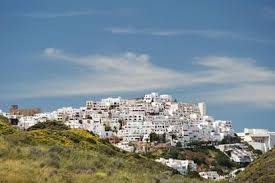 Around a hundred years ago, Mojácar had a population of six thousand people. Almost all of them lived either in the village itself, or in the surrounding hamlets, where water was available. Unlike today, few if any of them lived on the beach.
Around a hundred years ago, Mojácar had a population of six thousand people. Almost all of them lived either in the village itself, or in the surrounding hamlets, where water was available. Unlike today, few if any of them lived on the beach.
By the fifties, there was little left of the village. From six thousand, now only six hundred remained. Plans were afoot to be ruled from next-door Carboneras.
Then, the Civil Governor in far-off Almería City chose Jacinto Alarcón to be the new mayor. He offered to give away ruins to those who would fix them up within a year. There were several takers including a few senior foreign diplomats (the Calle de los Embajadores in the village is tribute to this).
His second idea was to approach the Minister of Tourism in Madrid, Manuel Fraga Iribarne, to build a Parador hotel on Mojácar Playa. To his astonishment, the minister agreed and the hotel opened in 1966.
Jacinto's ambitions worked and the fortunes of Mojácar were reversed. By 1965, the village was showing signs of life again.
Read the full story here:
.
Lenox Napier: Mojácar Rubble
Monday, 2 August 2021
A Spanish Passport
 There are a lot of pluses in being a foreigner.
There are a lot of pluses in being a foreigner.
One of them is that you can be eccentric without anyone minding too much (“ah well, foreigners, hey?”) and another is that you can learn a whole new culture: its language, history and customs.
If you want to.
Read this article in full here:
Lenox Napier: A Spanish Passport
Endword
So, Lenox, in 2025 I plan to go back to Mojácar for the first time in 35 years. To meet up with you; my friends A and T; and to show my lovely German wife Rita “wie die andere Hälfte lebt” (how the other half lives).
© Paul Whitelock
Links:
ANIMAL RIGHTS FOCUS: A positive view of bullfighting in Spain - Olive Press News Spain
Lenox Napier: A Spanish Passport
Lenox Napier found guilty of defaming the Euesdens - Olive Press News Spain
Lenox Napier: Mojácar Rubble
Acknowledgements:
Claire Wilson, La Voz de Almeria, Lenox Napier, Melanie Lupiáñez, The Olive Press
Photos:
Diario.es
Facebook
La Voz de Almeria
Minube
Real Estate
Spanish Shilling
Tags:
Almeria, “A Spanish Passport”, Business Over Tapas, Calle de los Embajadores, Claire Wilson, Euro Weekly News, “how the other half lives”, Jacinto Alarcón, La Sartén, La Voz de Almeria, Lenox Napier, Madrid, Málaga, Manuel Fraga Iribarne, Melanie Lupiáñez, Michel Euseden, Minister of Tourism, Mojácar, Mojácar Playa, Mojácar Rubble, Paul Whitelock, Parador, Pedro Sánchez's government, Ronda, Steven Euseden, The Entertainer